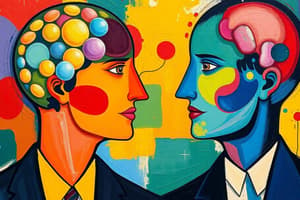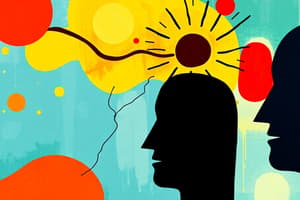Podcast
Questions and Answers
What do Watson and Skinner emphasize in their behaviorist approach?
What do Watson and Skinner emphasize in their behaviorist approach?
- The influence of biological factors on behavior
- The importance of unconscious psychological struggles
- The cognitive processes involved in decision making
- The role of observable behavior and learning through stimuli (correct)
What did Charles Darwin contribute to the understanding of behavior?
What did Charles Darwin contribute to the understanding of behavior?
- The establishment of the first psychology research lab
- The theory that behavior and mental processes evolve through natural selection (correct)
- The idea of behavior as a reflection of unconscious struggles
- The concept of operant conditioning
Which approach assumes knowledge is not innate but rather influenced by experience?
Which approach assumes knowledge is not innate but rather influenced by experience?
- Psychodynamic approach
- Biological approach
- Empiricism (correct)
- Humanistic approach
According to the psychodynamic approach, behavior is primarily shaped by what?
According to the psychodynamic approach, behavior is primarily shaped by what?
What does the cognitive approach focus on?
What does the cognitive approach focus on?
Which statement best describes the humanistic approach in psychology?
Which statement best describes the humanistic approach in psychology?
What is a primary focus of the biological approach in psychology?
What is a primary focus of the biological approach in psychology?
Behaviorism primarily studies the connection between which two elements?
Behaviorism primarily studies the connection between which two elements?
What happens to the just noticeable difference as stimulus magnitude increases?
What happens to the just noticeable difference as stimulus magnitude increases?
What is the process of converting incoming energy into neural activity called?
What is the process of converting incoming energy into neural activity called?
How is the perception of stimulus intensity related to its actual strength according to Fechner's Law?
How is the perception of stimulus intensity related to its actual strength according to Fechner's Law?
Which of the following describes what amplitude is in the context of sound?
Which of the following describes what amplitude is in the context of sound?
What does Weber's Law help to identify?
What does Weber's Law help to identify?
What characterizes sensory adaptation?
What characterizes sensory adaptation?
What is the primary role of neural receptors?
What is the primary role of neural receptors?
What unit is used to describe the frequency of sound waves?
What unit is used to describe the frequency of sound waves?
What are the three D's used to understand behavior in psychological disorders?
What are the three D's used to understand behavior in psychological disorders?
Which model views psychological disorders as arising from a combination of biological, psychological, and sociocultural factors?
Which model views psychological disorders as arising from a combination of biological, psychological, and sociocultural factors?
What does the diathesis-stress model explain about psychological disorders?
What does the diathesis-stress model explain about psychological disorders?
What does psychoanalysis primarily aim to help clients achieve?
What does psychoanalysis primarily aim to help clients achieve?
Which of the following best describes humanistic psychologists' view on human behavior?
Which of the following best describes humanistic psychologists' view on human behavior?
What is the primary focus of clinical neuropsychologists?
What is the primary focus of clinical neuropsychologists?
Which therapy aims to change clients' thinking and behavior through learned methods?
Which therapy aims to change clients' thinking and behavior through learned methods?
What does the medical model, or neurobiological model, suggest about psychological disorders?
What does the medical model, or neurobiological model, suggest about psychological disorders?
Which statement best describes the nature of emotional expressions?
Which statement best describes the nature of emotional expressions?
What role does the sympathetic nervous system play in emotional experiences?
What role does the sympathetic nervous system play in emotional experiences?
What is the significance of the process of attribution in the context of emotions?
What is the significance of the process of attribution in the context of emotions?
Which of the following statements is true regarding universal emotional expressions?
Which of the following statements is true regarding universal emotional expressions?
Which of the following best describes health psychology?
Which of the following best describes health psychology?
How do social rules influence emotional expressions?
How do social rules influence emotional expressions?
What is a potential challenge for prison officers with respect to wellbeing?
What is a potential challenge for prison officers with respect to wellbeing?
Which of the following factors can significantly impact the relationship between stress and performance?
Which of the following factors can significantly impact the relationship between stress and performance?
What does the principle of localisation of function suggest?
What does the principle of localisation of function suggest?
Which of the following best describes a stroke?
Which of the following best describes a stroke?
What are modules in the context of brain function?
What are modules in the context of brain function?
What is the primary purpose of neuropsychological assessment?
What is the primary purpose of neuropsychological assessment?
Which brain dysfunction mechanism is likely to result in symptoms specific to an affected brain area?
Which brain dysfunction mechanism is likely to result in symptoms specific to an affected brain area?
Which characteristic is associated with traumatic brain injury?
Which characteristic is associated with traumatic brain injury?
What does lesion analysis study to connect psychological functions to brain areas?
What does lesion analysis study to connect psychological functions to brain areas?
What are amnestic disorders primarily characterized by?
What are amnestic disorders primarily characterized by?
Flashcards are hidden until you start studying
Study Notes
Behaviorism
- John B. Watson and B.F. Skinner were key figures in the development of behaviorism, focusing on observable behavior and its relationship to environmental stimuli.
- Behaviorism aims to explain behavior through learning principles, specifically operant conditioning.
History of Psychology
- Charles Darwin's theory of evolution, emphasising natural selection, impacted psychology.
- Wilhelm Wundt established the first psychology research laboratory in 1879.
Approaches to Psychology
- The Biological Approach posits that our behaviour and mental processes are shaped by biological factors, such as hormones and genes.
- The Evolutionary Approach applies Darwin's theory of evolution to understand human behavior and mental processes, assuming they are the result of natural selection.
- The Psychodynamic Approach focuses on unconscious psychological conflicts, rooted in the work of Sigmund Freud.
- The Cognitive Approach is interested in how we perceive, process, and use information in shaping our behavior, emphasizing mental representations and cognitive processes.
- The Humanistic Approach (also known as the Phenomenological Approach) believes that individuals have the capacity to make choices and guide their own actions, with behavior driven by personal perceptions and a drive for growth.
Senses and Perception
- Sensory systems are responsible for translating information from the environment into neural activity.
- Sensations are the raw information received from the senses, influencing behavior and mental processes.
- Neural receptors are specialized cells that detect specific forms of energy and convert them into neural activity.
- Transduction is the process of converting incoming energy into neural activity.
- Sensory adaptation occurs when our responsiveness to an unchanging stimulus decreases over time.
Psychophysics
- Psychophysics investigates the relationship between physical characteristics of stimuli and our psychological experiences.
- Signal detection theory models how our personal sensitivity and response bias influence our decisions about stimuli.
- Weber's Law states that the just noticeable difference (JND), the smallest detectable difference between stimuli, increases proportionally to the magnitude of the original stimulus.
- Fechner's Law suggests that perceived stimulus intensity is related to the actual strength of the stimulus.
Hearing
- Sound is created by repetitive pressure fluctuations in a medium, such as air.
- Amplitude refers to the difference between the peak and baseline of a waveform, determining intensity or loudness.
- Wavelength measures the distance between two consecutive peaks in a waveform.
- Frequency represents the number of complete waveforms per second, measured in Hertz (Hz), and determines pitch.
Emotions
- Emotions are temporary experiences with positive, negative, or mixed qualities.
- The Autonomic Nervous System plays a vital role in the physiological changes associated with emotions.
- The Sympathetic Nervous System prepares the body for "fight-or-flight" responses to threats.
- Attribution is crucial in cognitive theories of emotions, as it refers to the process of explaining the cause of our emotions.
- Polygraph testing relies on the physiological theory of emotions to detect lies.
- Research on the brain's pleasure centers supports biological theories of emotions.
- Universal facial expressions associated with sadness, anger, and happiness provide evidence of innate emotional expression.
Stress and Coping
- Health Psychology aims to promote human health and prevent illness through research and application.
- Sociocultural factors influence how abnormality is perceived and manifested.
- Abnormal behavior is often characterized by deviance, distress, and dysfunction.
- The Biopsychosocial Approach views mental disorders as resulting from a combination of biological, psychological, and sociocultural factors.
- The Medical Model (Neurobiological Model) suggests that mental disorders are rooted in brain abnormalities and biological processes.
- The Psychological Processes Model sees mental disorders as arising from psychological processes.
- The Diathesis-Stress Model proposes that a predisposition for a disorder, combined with sufficient stress, triggers symptoms.
- Psychoanalysis is a therapeutic approach that seeks to help clients understand unconscious thoughts and emotions.
- Humanistic Psychology emphasizes individual control, responsibility, and a drive for growth as motivators for behavior.
- Cognitive-Behavioral Therapy (CBT) focuses on changing both thoughts and behaviors using learning principles.
Neuropsychology
- Neuropsychology investigates the relationship between brain processes, behavior, and mental functioning.
- Neuropsychologists study how brain systems and their disruptions affect cognitive abilities.
- Clinical Neuropsychologists use testing and other methods to assess neuropsychological problems and intact functions in individual patients.
- Localization of Function proposes that specific psychological functions are tied to specific brain areas.
- Stroke refers to a loss of blood supply to a part of the brain, leading to behavioral or mental disruptions.
- Lesion indicates an area of damaged tissue in the brain.
- Modules represent brain regions dedicated to specific processing tasks.
- Neuropsychological Assessment involves testing cognitive and sensory functions to identify brain problems.
Principles of Neuropsychology
- Localization of Function (Franz Gall, Paul Broca) suggests specific psychological functions are linked to specific brain areas.
- Modularity (late 1900s) revises localization, proposing that each brain area performs unique calculations contributing to various functions.
- Networks (late 1900s) suggests that complex functions rely on unique combinations of brain modules.
- Lesion Analysis (1800s-present) links psychological functions to brain areas by studying patients with brain damage.
Mechanisms of Brain Dysfunction
- Cerebrovascular Accident (Stroke): Blood flow interruption to a brain area, causing damage specific to that region.
- Traumatic Brain Injury: Head trauma leading to brain movement, often causing non-specific symptoms.
- Neurodegenerative Disease: Specific neuron types become diseased, leading to dysfunction specific to those cells.
Neuropsychological Disorders
- Amnestic Disorders: Memory loss, consciousness disturbance, perceptual disturbances, and movement disorders.
- Traumatic Brain Injury: Impact to the brain caused by a blow or sudden head movement.
Studying That Suits You
Use AI to generate personalized quizzes and flashcards to suit your learning preferences.




